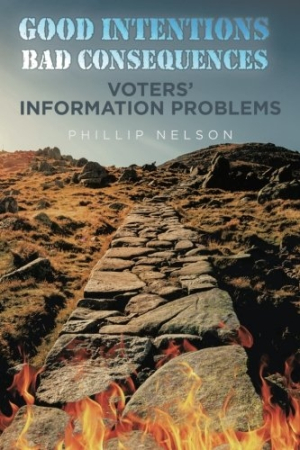Good Intentions, Bad Consequences
Voters' Information Problems
Fundamentally a story about human nature as it is currently constituted, Nelson’s book paints a grim picture, but also offers cause for hope.
Phillip Nelson’s Good Intentions, Bad Consequences is not a comforting read. In fact, this book, which mixes economics, philosophy, and political science, pointedly says that American voters, and indeed voters in all western democracies, are suffering from a serious education deficit.
The problems that Nelson raises and the solutions that he offers are not part of the usual panacea. Throwing more people into higher education is not the answer, he says, because the instruction is bad and completely biased—too many professors are “strong liberals” who promote cognitive bias, confirmation bias, and the plague of naive altruism. Telling more people to read newspapers is similarly no solution, he asserts, given that the same type of people run newspapers.
Nelson also argues that few American voters understand that votes have consequences. Intentions, especially moral, altruistic ones, are only one part of the voting process—the results of votes matter, too.
Underneath his very dry and academic style of writing, Nelson forwards some explosive ideas: that the minimum wage increases income inequality and leads to higher levels of unemployment, that welfare incentivizes generational poverty rather than economic uplift, and that most government programs designed to aid the underprivileged do just the opposite. The only reason such programs continue to be popular, he says, is because most American voters do not feel the effects of federal legislation and would rather feel “right” and “just” in their intentions.
This thoroughly argued text doesn’t ask to be popular. Nelson’s ideas about human nature and the inefficiencies of democracy are not uplifting or inspiring. On another level, Nelson, a economist with libertarian leanings, makes the classic libertarian mistake of seeing humanity as mostly propelled by rational, market-centric concerns, though he does acknowledge that humans are mostly irrational.
Though it is a fast, easy read, Nelson’s academic background means that the book relies quite a bit on economic, sociological, and political science studies done by other authors. It might be a good idea to read some of those studies in conjunction with Nelson’s slim volume. Though this book can be read alone, a fuller understanding of the problems it presents requires a deeper dive into the wider academic world.
Fundamentally a story about human nature as it is currently constituted, this book paints a grim picture, though it offers hope that people can correct the course so long as everyone—conservative or liberal––is willing to consider the consequences of their political positions.
Reviewed by
Benjamin Welton
Disclosure: This article is not an endorsement, but a review. The publisher of this book provided free copies of the book and paid a small fee to have their book reviewed by a professional reviewer. Foreword Reviews and Clarion Reviews make no guarantee that the publisher will receive a positive review. Foreword Magazine, Inc. is disclosing this in accordance with the Federal Trade Commission’s 16 CFR, Part 255.

